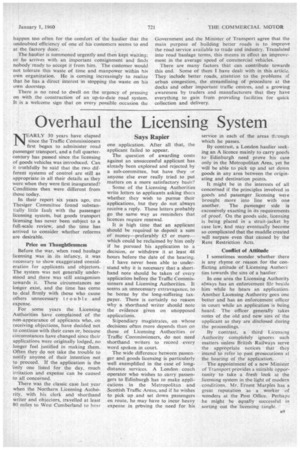Overhaul the Licensing System
Page 43

If you've noticed an error in this article please click here to report it so we can fix it.
Says Rapier since 30 years have elapsed
since the Traffic Commissioners first began to administer road passenger transport, and a full quartercentury has passed since the licensing of goods vehicles was introduced. Can it truthfully be said that the two different systems of control are still as appropriate in all their details as they were when they were first inaugurated? Conditions then were different from those today.
In their report six years ago, me Thesiger Committee found substantially little fault with the passenger licensing system, but goods transport licensing has never been subject to a full-scale review, and the time has arrived to consider whether reforms are desirable.
Price on Thoughtlessness
Before the war, when road haulage licensing was in its infancy, it was necessary to show exaggerated consideration for applicants and objectors. The system was not generally understood and there was still antagonism towards it. These circumstances no longer exist, and the time has come to deal firmly with those who cause others unnecessary trouble and expense.
• For some years the Licensing Authorities have complained of the non-appearance of applicants who, on receiving objections, have decided not to continue with their cases or, because circumstances have changed since their applications were originally lodged, no longer feel justified in making them. Often they do not take the trouble to notify anyone of their intention not to proceed. If the application is the 'Only one listed for the day, much irritation and expense can be caused to all concerned.
There was the classic case last year when the Northern Licensing Authority, with his clerk and shorthand writer and objectors, travelled at least 80 miles to West Cumberland to her one application. After all that, the applicant failed to appear.
The question of awarding costs against an unsuccessful applicant has already been explored and rejected by a sub-committee, but have they or anyone else ever really tried to put matters on a more satisfactory basis?
Some of the Licensing Authorities write letters to applicants asking them whether they wish to pursue their applications, but they do not always receive a reply. Those letters probably go the same way as reminders that licences require renewal.
It is high time that an applicant should he required to deposit a sum of money—preferably IS or more— which could be reclaimed by him only if he pursued his application to a decision, or withdrew it at least 48 hours before the date of the hearing.
I have never been able to understand why it is necessary that a shorthand note should be taken of every application before the Traffic Conimissioners and Licensing Authorities. It seems an unnecessary extravagance, to be borne by the long-suffering taxpayer. There is certainly no reason why a shorthand writer should note the evidence given on unopposed applications.
Stipendiary magistrates, on whose decisions often more depends than on those of Licensing Authorities or Traffic Commissioners, do not need shorthand writers to record every word spoken in court.
The wide difference between passenger and goods licensing is particularly well exemplified in the case of longdistance services. A London coach operator who wishes to carry passengers to Edinburgh has to make applications in the Metropolitan and Scottish Traffic Areas, and if he wishes to pick up . and set down passengers en route, he may have to incur heavy expense in proving the need for his service in each of the areas through which he passes.
By contrast, a London haulier seeking an A licence mainly to carry goods to Edinburgh need prove his case only in the Metropolitan Area, yet he will be able to pick up and set down goods in any area between the originating and destination points.
It might be in the interests of all concerned if the principles involved in goods and passenger licensing weie brought more into line with one another. The passenger side is excessively exacting in its requirements of proof. On the goods side, licensing is being placed in a strait-jacket by case law, and may eventually become so complicated that the muddle created will surpass even that caused by the Rent Restriction Acts.
Conflict of Attitude
I sometimes wonder whether there is any rhyme or reason for the conflicting attitude of Licensing Authori. ties towards the sins of a haulier.
In one area the Licensing Authority always has an enforcement file beside him while he hears an application. Another Licensing Authority goes one better and has an enforcement officer in court while an application is being heard. The officer generally takes notes of the old and new sins of the applicant as they are disclosed during the proceedings.
By contrast, a third Licensing Authority completely ignores such matters Unless British Railways serve the appropriate notices that they intend to refer to past prosecutions at the hearing of the application.
The appointment of a new Minister of Transport provides a suitable opportunity to take a fresh look at the licensing system in the light of modern conditions. Mr. Ernest Marples has a great reputation 'as a worker of wonders at the Post Office. Perhaps he might be 'equally successful in sorting out the licensing tangle.




























































































